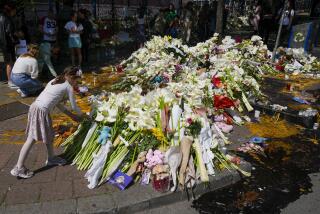Serbs Advance Unchecked in Croatia : Yugoslavia: Priest cites villager’s death as ‘a warning for us to turn toward God.’
- Share via
PETRINJA, Croatia — The sound of a lone high-powered rifle, firing intermittently, rang out across the green farm valley as they lowered Jagica Lovrekovic’s wooden coffin into the hillside clay Friday.
Her friends, neighbors and relatives, most of them refugees from the nearby village of Prnjavor, where she was killed, shifted uneasily on the cemetery slope around her open grave. It was impossible, from that distance, to guess the target of the rifleman, but the sound and meaning of gunfire were no stranger here.
Lovrekovic was 70 years old. She was killed Monday in the yard of her house in Prnjavor. She was shot twice in the throat, apparently while she was standing, and twice more on the ground. Her body lay in the yard for two days before her neighbors managed to recover it.
Prnjavor, a hamlet of about 50 houses and 250 people, had been evacuated for nearly two weeks, its residents fleeing with those of neighboring Croatian villages to escape the advance of Serbian guerrillas, fighting for the evident annexation of Croatian territory.
Lovrekovic had gone back, as she had in the evenings for several days, to feed her animals. She had spent the night in the house, her neighbors said, and was shot as she came out in the morning to feed her dog.
Another rifle shot echoed across the valley as Father Stjpen Levanic turned a spadeful of earth onto the coffin.
“She gave her life as a warning for us to turn toward God,” he said. “The shooting we hear now is an invitation to hatred. Those who hate and think with weapons, there is a place for them, who deceive the world. Let us not hate, let us be brave. . . . Jagica did many good things, and she will be remembered for them, and those who are shooting will be forgotten.”
Those who have been shooting cannot be put out of mind yet, however, either by these villagers, some of whom have not been in their homes for the last two weeks, or by the 15,000 residents of Petrinja, which stands as one of the next towns in line for the Serbian advance, which has so far proved unstoppable.
Lovrekovic’s death was one of about 100 this week, one of about 200 recorded so far since the Serbian campaign for Croatian territory began two weeks ago.
Tanjug, the Yugoslav news agency in Belgrade, said Friday that the death toll had reached 80 in Dalj, where Serbian guerrilla units, backed by the Yugoslav federal army, attacked Thursday. The number was impossible to verify immediately. Croatian President Franjo Tudjman said Friday that 20 Croatian police had been confirmed killed and 45 remained missing.
In the wake of the violence, the federal presidency ordered a cease-fire in Croatia early today. But it was unclear whether the fighters would comply with the order because a presidential statement indicated that Croatia’s Stipe Mesic, chairman of the presidency, voted against the plan.
Since last weekend, the Serbian units have taken over a series of towns and villages in the Banija farmland region of Croatia and have approached to within 30 miles of the republic’s capital, Zagreb.
Croatian national guard units have been driven back in each clash with the Serbs, but the Serbian paramilitary units have been aided significantly by the federal army. Although the army is officially in the field to separate the warring Croatian and Serbian units, the intercession of federal troops--led by a largely Serbian officer corps--has worked to consolidate the Serbian gains.
Croatia declared its independence from Yugoslavia in June, but, with 600,000 Serbs among Croatia’s population, the neighboring republic of Serbia is opposing the secession. Serbian fighters say they are intent on linking a heavily Serbian area they call the Krajina to Serbia.
Serbian militia units have now secured about one-third of Croatia, clearing Croatian police and national guard units out of town and village police stations. Thousands of refugees have packed up what belongings they can carry and have fled to safe areas to live with relatives and friends.
This week, in a series of villages along the Danube River near the Croatian city of Osijek, the Croatian forces have suffered setbacks daily, leaving Tudjman’s Croatian government, which was elected on a strongly nationalistic platform, impotent to halt the Serbian advance. In an address to an emergency session of the Croatian Parliament on Thursday, Tudjman acknowledged that the government did not have arms to equip its defenders.
Three European Community foreign ministers arrived in Zagreb on Friday evening, hoping, against what appeared to be long odds, to win a cease-fire.
The leader of the peace mission, Dutch Foreign Minister Hans van den Broek, told Dutch radio that he has “no great objections in principle” to the deployment of a European peacekeeping force but that a cease-fire was a “precondition” to sending European peacekeeping observers.
More to Read
Sign up for Essential California
The most important California stories and recommendations in your inbox every morning.
You may occasionally receive promotional content from the Los Angeles Times.













